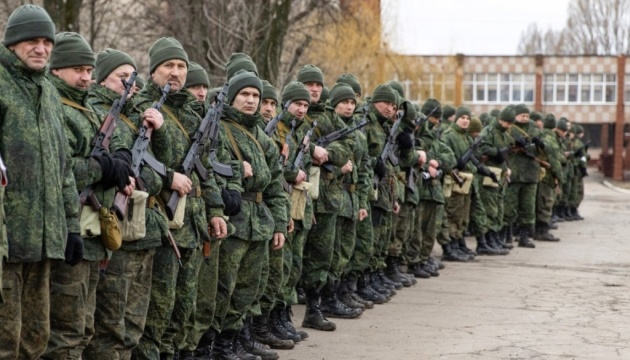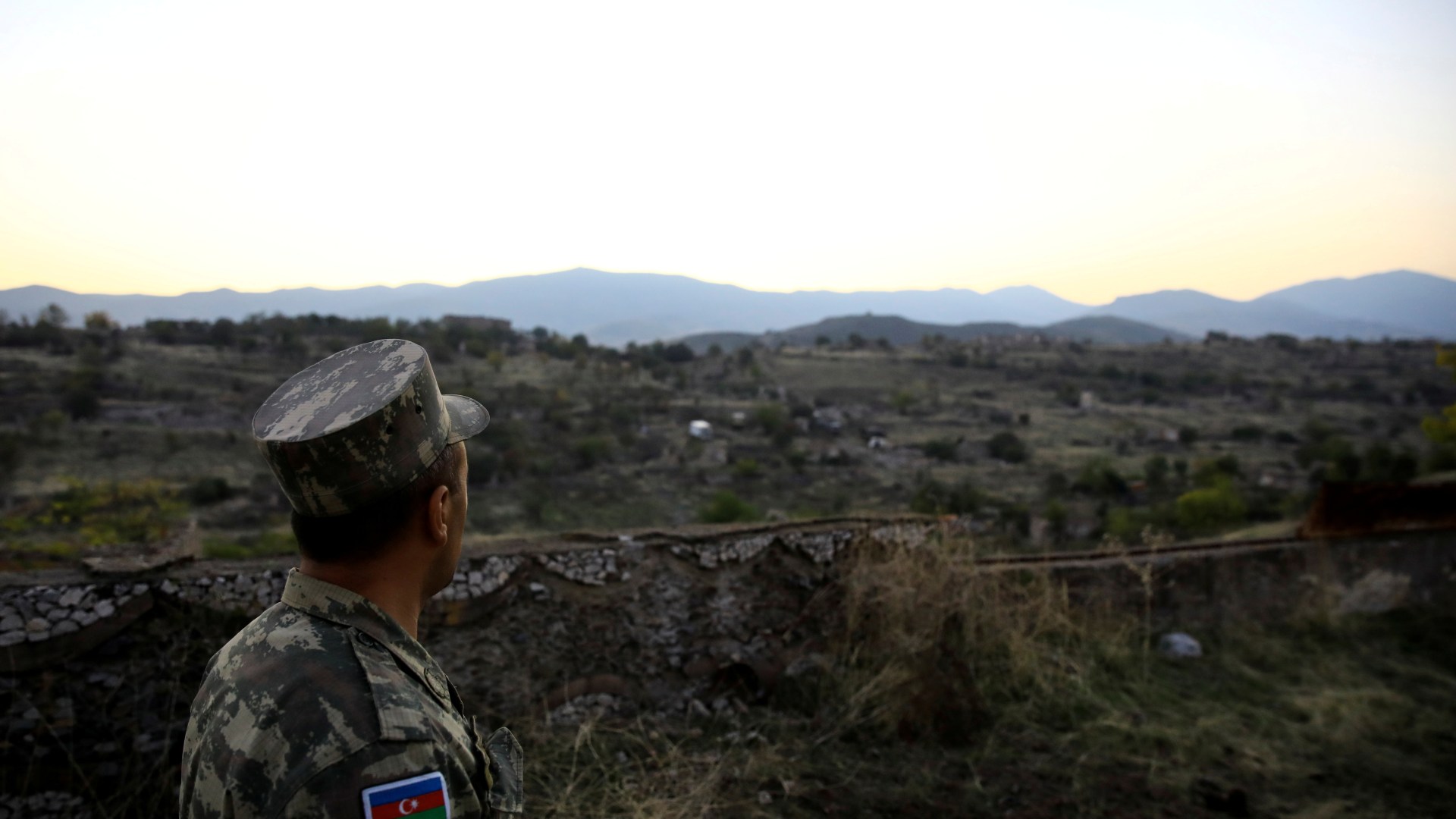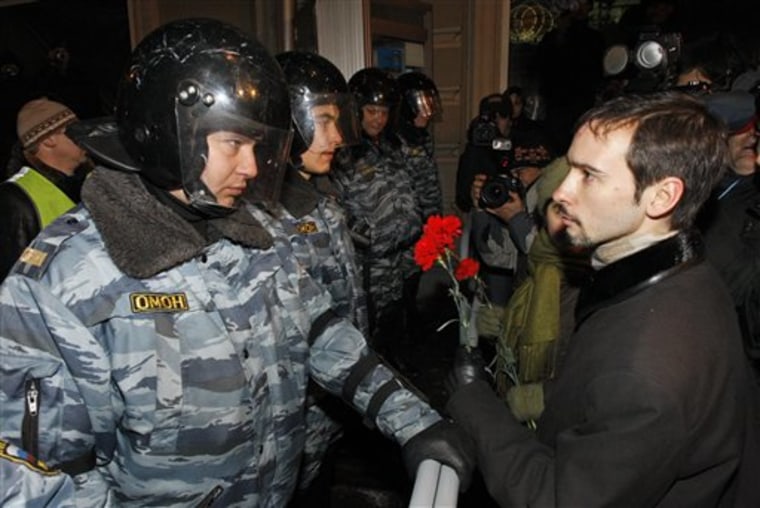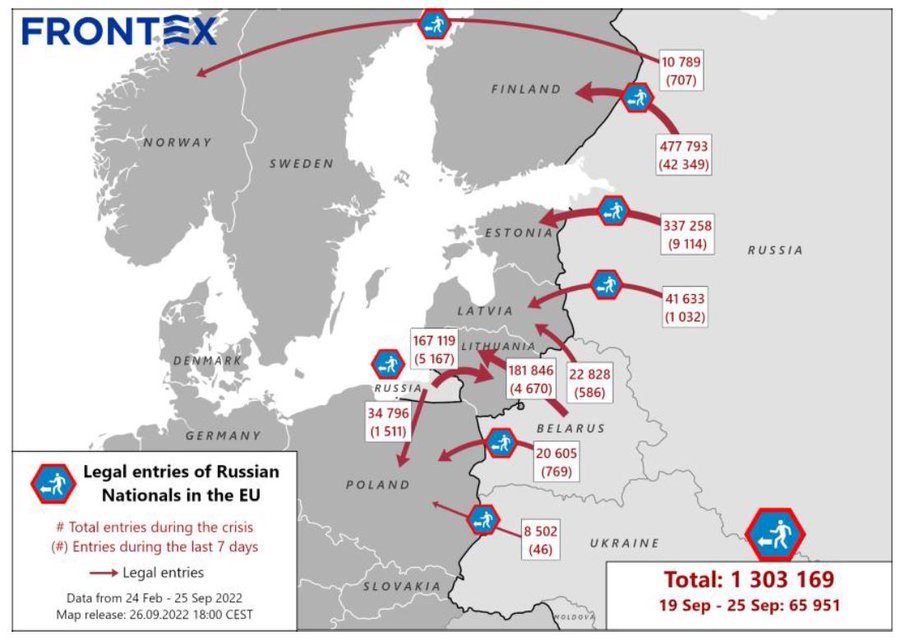-
Ukraine Crisis
Yes, the later waves coming by cargo aircraft couldn't land as the fighting continued. Basically the Hostomel Airport (or Antonov Airport) I guess was the furthest Russian forces came.Also, the purpose of taking the airport is to use it. Failure to secure it through combined forces is part and parcel to the failure of the whole operation as detailed in this comparison of Hostomel with the failure of Market Garden in WW2 — Paine
And withdrew later.And they were relieved, weren't they? — Tzeentch -
Ukraine Crisis
With the assumption that the airborne force can be then quite quickly be relieved by a ground force. Nobody thinks of making a landing deep in enemy territory and then just assume that they can be evacuated by air from the area if faced by a heavy counterattack.Sure they can. Airports are a classic target for airborne assaults. — Tzeentch
Once an airborne detachment has occupied an area, it can basically hold on to that area until relieved. And that's basically it. Operation Mercury was the first, and the last, time when an air assault was planned to do basically everything.
-
Ukraine Crisis
Not with landing paratroops on them. This was classic way to use paratroop landings to ease the attack towards the capital.It seems to me taking out airports would be a key strategic goal regardless of their intentions. — Tzeentch
Do notice the location of Hostomel airport:

-
Ukraine CrisisBut I do agree with this: once the defender will defend, then any kind of "Thunder run" into the city is nearly suicidal. Russian's learnt this during the first Chechen war. Yet taking the capital is quite important since the times of Clausewitz.
However quickly they noticed the mistake, to assume in the first place such an attack was a real blunder. It's quite clear that this quick strike into the heart of Ukraine was attempted. The heliborne landings in Hostomel Airport just next to Kyiv show the intent what Russians had.
-
Ukraine Crisis
Not the failed attempt of quickly reaching the capital?The only real blunder I have seen from the Russian military is the sinking of the Moskva. — Tzeentch
The Russians’ armored columns were not dispersed and spread out across a massive plain, as in the World War II during the largest tank battle in history at the Battle of Kursk (500 east of Kyiv). In hindsight the Russian desire for need for offensive speed and mass, vs dispersed security and maneuver, was a poor strategy. Instead, these massive, armored columns were attacking in formation on multiple lane highways in convoys that were up to 40 miles long. Javelins fired from up to a mile away with precision accuracy, completely destroying the first tanks or BMPs could stall the whole column. Then pre-sighted artillery claimed the majority of Russian casualties. For several days the 40-mile armored column north of Kyiv was stalled after sustaining massive casualties.
Or not the "special military operation" having to resort mobilization of reservists after a successful Ukrainian counter attack? If I recall, Putin was first saying that conscripts wouldn't be used in the operation. :smirk:
Putin annexes territory, from where he is retreating from...
-
Greatest Power: The State, The Church, or The Corporation?Consider the question the following way:
A) Which one of them can simply be terminated by a degree from a judge?
B) Which one of them can terminated by it joining another, by annexation or invasion by force?
C) Which one of them dies basically as the last human person believing in it dies?
If we understand "Church" as Religion, then it is at least the most persistent. In our secular society the Church may look as to have the least power, but looks can be deceiving. -
Ukraine Crisis
You just hold your racist hints to yourself.Ah, that generalised Russian uselessness we hear so much about. An entire nation just generally a bit crap. — Isaac
Corruption makes it Russia what it is. And Putin has created a kleptocracy. It's not the people themselves. Individuals are quite the same. How societies function is different.
And lastly, which likely you might not understand, is that many Russians understand that they attacked Ukraine, a country which didn't threaten them in any way. The reaction from the Russian people and the fighting spirit of the Russian soldier would be different, if their country was attacked and they would defend their country from an aggressor that describes them to be an artificial country. Then it would be Russians military aged men coming from abroad to join the military. (As in the case of...Ukraine) -
Ukraine CrisisI'd say it like this.
After the Russo-Georgian war in 2008, which Russia won only because Georgia was even more unprepared for the war (basically the field commander was one major) and because Russia had numerical superiority, the need to modernize and dramatically reorganize the armed forces was evident to all and was started by Putin.
Russia modernized it's forces equipment partly, that is true. Partly because it had a huge force to modernize. Planes and tanks couldn't be built in the thousands. Yet Russia could do a very successful military operation with the annexation of Crimea. It used it's most elite troops, the VDV paratroops and military intelligence soldiers (from the GRU) in this operation. Here strategic surprise was achieved and the information warfare of the intelligence services worked extremely well. And this good performance lead to people think that Russia had really modernized itself.
Then it performed well in Syria too, yet with a rather small contingent. Basically it had two squadrons of mixed combat aircraft and air base Air Defence + security troops in Syria. Some mercenaries were used, but in all this was a small force. Yet it helped Assad substantially. Again everything looked good.
Then suddenly this Putin decided to do an all out attack against Ukraine and start a huge conventional war that basically involved the majority of Russia Army ground forces. Not only the elite troops, not only a small limited force that then could be backed up logistically by other troops. Nope, basically everything was involved! Then the attack came as a surpise to many in the forces, as the official line was that Putin wouldn't be invading (which some in this thread believed).
Here the Potemkin village collapsed. Basically it would be stressful to any armed forces that is used to limited operations, then suddenly face an all out conventional war.
And needless to say, the Ukrainians themselves have a lot to do with the poor performance of Russia. They did't collapse as the Afghan National Army. They had been preparing for this from 2014. Not only was the Ukrainian armed forces quite large, it also had the will to defend it's country (unlike some here seem to forget and think it would have been better for them just to surrender).
Hence the theory isn't that Putin chose a crappy army. More like the crappy Russian system couldn't make it any better and the really crappy idea of invading Ukraine cemented the outcome. -
Ukraine Crisis
These "problems" were already called out, when Siemens did provide the services. But of course this is just theater, basically.Gazprom already declared force majeure earlier this year, apparently due to its "problems" with turbines. — SophistiCat
Everybody agrees with that. The majority also believe that Putin is ideologically committed to expanding the Russian empire. :smirk:So you're not on board with the idea that Putin is ideologically committed to expanding the Russian empire militarily? — Isaac -
Ukraine CrisisLikely heightened security on oil infrastructure, apparently.
Let's not hope it goes to things like in Saudi-Arabia...

At least now (with the Baltic gas pipeline sabotage) Gazprom can refer to force majeure and not be worried about fines from not holding up gas deals.
Happier times with Nordstream earlier... Angela and Dmitri had fun back then. Now literally the thing ended with bangs.

-
Ukraine Crisis
Actually, they did thought about far earlier to get Crimea. Just after the Soviet Union collapsed, the debate started like this:And the point of this fact is simply to establish the obvious that the Kremlin has obviously been thinking about conflict in Ukraine since 2014, if not before. — boethius
See here(LA Times, 22nd May, 1992) Running the risk of provoking Ukraine to new heights of fury, Russia’s Parliament on Thursday ruled invalid the 1954 transfer of the balmy Crimean Peninsula to Ukraine.
In a move sure to bring relations between the two superpowers of the Commonwealth of Independent States even closer to the boiling point, the Russian Parliament declared that Soviet leader Nikita S. Khrushchev’s “gift” of the Crimea to Ukraine 38 years ago “lacked legal force.” It called for negotiations on the future of the choice hunk of land.
Although Russian lawmakers stressed repeatedly that they were making no territorial claims on the Crimea, Ukrainian diplomats perceived the resolution as the harbinger of major political--and possibly military--battles.
Perceived very well by the Ukrainian diplomats, actually. -
Ukraine Crisis
This was basically totally normal during the Cold War.The US is giving (not selling) arms to Ukraine, providing training and managing strategy and tactics "indirectly" via "advice", and providing the intelligence required for planning and targeting. These are obvious acts of war along with the sanctions. — boethius
That the other side aided his ally/proxy was totally in line. So in line that actually there was far more "military advisors" operating the complex hardware in Third World countries than now. Especially the Soviet Union was good at this... and had it's military forces in civilian clothes.
(The Parade step shows just who these advisors are:)

So you start again...
However, I am at least putting undisputed facts about the past together, rather than telling a story — boethius
And then continue...
Russian language and culture suppression made Putin do it!!! Gentlemen! Here are the facts, not stories,... :snicker:1. War has been going on since 2014 with Russian language and culture suppression, that, at minimum, is likely to attract the Kremlins attention as a problem to deal with. — boethius
So according to you Russia's commitment to modernizing it's armed forces is proven by a single test firing of an experimental missile? The massive footage of Russia scraping the bottom of the barrel with 50 year-old tanks sent to Ukraine, with the mobilization troops in conditions that show total unpreparedness for them doesn't refute this modernization, because they test whatever exotic missile they have? Incredible pro-Russian propaganda. :rofl:Russia heavily invests in modernising its armed forces since 2014 as well as preparing for sanctions. That the Russian economy and currency survive essentially maximum sanctions is I think good evidence they adequately prepared for the latter, and that one of the first things they do is launch a hypersonic missile is good indication of the former; the war launched, by definition, after accomplishing these pre-conditions. — boethius
Whow. I really haven't heard such blazing over the top apologism from anyone in this thread for Putin.7. Lastly, we know Putin is a sophisticated enough in his thinking and planning to navigate the halls of power for several decades without any major self-inflicted harms to himself or Russia, and certainly doing better than his predecessor which is the only objective comparison standard. Certainly anyone can lose their grip on reality at any moment, but there is no indication that's true of Putin so far. — boethius
Yeah, I think I'll stop as this is pointless. -
Ukraine Crisis
For a country that freely gave away it's nuclear deterrent, it has already hinted that it would do this. If Ukraine wouldn't be in NATO, this would be the totally logical policy. Hence it's far better for Ukraine to join NATO after this war as developing a nuclear weapon is still quite costly in this World.However this war ends, Ukraine will end up with a large incentive to develop nuclear weapons and missiles capable of reaching strategic targets in Russia in order to avoid future attacks. — Count Timothy von Icarus
That's what Russia wants the West to think, at least.I think Putin wants to stop where he is and just defend the (soon to be) annexed territories. If they're part of Russia, attempts to take them back are supposed to be an attack on Russia. — frank
As I said earlier, if Putin opts to use tactical nukes, he is playing Russian roulette, and not only in figuratively.Given the inner turmoil in Russia, people fleeing and protesting and so on, the timer is on for Putin, much more than at any stage during this war.
We can hope this doesn't cause him to break and go for broke, or he could be thrown out by the military. Too many variables in the equation. — Manuel
However, let's remember that when Russia annexes the territories of "Novorossiya", then it's the scenario that it has trained for in past exercises: that NATO attacks Russia and they end they conflict with using nuclear weapons. So it's a possibility...if it becomes a full-scale route in Ukraine. So I think it's a possibility, however small.
I think this is a little too much bragging from Hamish de Bretton-Gordon. Is NATO going to attack them when the launchers move out of their garrisons? Hell no! Hence you are talking about a truck-size target that can be stored in any storage facility, garage, cowshed or where ever. It can be anywhere. The idea that NATO could pick up all the tactical nukes is simply ludicrous. In fact, just how elusive the HIMARS launchers have been tells how difficult this really is.I believe Putin’s tactical nuclear weapons are unusable. Even if their vehicles do work, the minute they turn their engines on to move they will be picked up by US and NATO intelligence.
And what if the launchers are now in Belarus. as Putin has said? (See here) Is NATO going attack out of the blue Belarus?
Let's look at history:
1) During the Cuban missile crisis the US was blissfully ignorant about the deployed Russian tactical nukes in Cuba. Hence if US Marines would landed in Cuba as in one plan, the beaches would have been nuked. At least Fidel Castro was very eager to use them if the Americans would attack. The existence of Russian tactical nukes in Cuba was only later found out, which horrified people like former defense secretary McNamara.
2) During Desert Storm Saddam Hussein launched Scud missiles against Israel from the Western Desert of Iraq. The US lead alliance put a lot of airpower to hunt them down and inserted special forces there also, which meant that a lot F-15E and other fighter bombers flew across the desert in vain to find the mobile launchers. To my knowledge, no Scud-launchers were found and destroyed. (If the Special Forces would have done that, you bet there would be the motion picture about it. Now we have the memoir of a SAS soldier in Bravo Two Zero which tells how this didn't happen). And Iraq is a Goddam desert and Iraq's military isn't the sharpest tool in town.
Hence I think this goes a bit to the propaganda side...

-
Brexit
Well, not literally, just as the UK hasn't been referred to the 'ex'.The EU has never said anything like that — Olivier5
Ok.And now there is complaint that because we don't want to cooperate on any these issue, the EU insists on having some checks on the flow of goods into its territory. How very dare they! — unenlightened
How about the border between Finland and Sweden and non-EU member Norway? If I move to Norway or a Norwegian moves to Helsinki, the only thing I have to do is to change my address. That's right, no applications, no passports, no permits needed. No control at the border. After changing my address, then tax officials notice it and I'll start to pay taxes to the new country where I live.
The EU-Norwegian border hasn't been a problem. Absolutely none.
Why?
Because Norway is part of the European Economic Area, the EEA.
This was an option that was thought about in the case of the UK, but for some reason, this wasn't OK for either UK or others. Perhaps being a member of EEA would have been too much for the Brexiteers, I don't know. So you ended up with a clean table. That's the problem here. -
Conscription
Actually it is to mobilize reservists, those who already have served their military service (conscription). Those that are on the military payroll have already been through. The idea was to use only these volunteer soldiers and not the conscripts in Ukraine. But the likely fact is that conscripts, those that aren't raw recruits, have been used in Ukraine for a long time already.I was just pointing out that ‘partial mobilisation’ is about putting people on the military payroll into battle. If someone is willing to sign up and take money that is their choice. — I like sushi
The fact that students have been put into service, who have since Soviet times been free from conscription just tells how badly the process has been.
You can see from the photos, that obviously not everybody now mobilized is in his twenties:



Russia doesn't have a territorial army (?), that's what I guess the UK has. -
Conscription
What is full mobilization? 25 million people in the case of Russia? I think they worry that the partial mobilization will call them.The people fleeing are likely fleeing to avoid the next step - full mobilisation. — I like sushi
The tiny little problem is that those 25 million men, even if Russians, aren't just sitting idly in a bar drinking vodka. Even 1 million to the army means basically 1 million crucial jobs lost from the society. That makes a huge economic loss for the economy. Then Russians should look at their history and notice what can happen if a many million strong army is demoralized and in no mood to follow the leaders. And the simple fact is that the limited arms and equipment limits the size of the army.
In fact, we can see totally clearly this from the case of Ukraine. It's happy with a reserve of 700 000 and large part of that isn't mobilized and not on the front. Yet when you take all the military aged men, you are talking about over 7 000 000 men in Ukraine. Russia has military aged men 33 million and of whom theoretical reservists are 25 million. Even a million strong force would be a huge problem to arm, train and deploy. And notice then that would be far bigger than the Putin's security system policing the people. -
Ukraine CrisisFinally even our country wants to follow Trump. If visas are unobtainable and things go the way as they are going now in Russia, illegal entry could be an issue.
The Border Guard wants to build 130 - 260 km fence on our 1300 km border with Russia. The project is estimated to take 3 to 4 years. Now there is no fence or anything physical on the border. Just an narrow corridor in the forests with border stones marking where the border is.
(This isn't reality yet between Finland and Russia)

-
Brexit
I wouldn't see it on such dramatic terms.Unfortunately, there is no getting past Brexit, hence the slogan 'Get Brexit done'. The Irish question cannot be resolved. As long as North and South were in the EU, the border could be open and thus demilitarised, and the EU functioned as an overseer of fair play. But separation entails a border, so the options are the breakup of the UK and reunification of Ireland, or the imposition of a manned border and resumption of civil war. — unenlightened
I think the EU itself ought to look at this from a new light. OK, so the Union has now an ex. Yet it's an ex that everybody actually still likes. For example, for my country the UK is a very important trading partner. Hence the new "ex" should be approached just like other non-EU countries, like the US or Canada (or Norway), where good relations are an objective for the EU also. There's still so much to be done together with the ex, just like taking care of security issues, which just cannot be forgotten. The EU simply is in utter denial, if it thinks this ex of it's doesn't matter anymore.
For the EU the stance that "I don't have anything to do with you now after we broke up" simply doesn't cut it. -
Ukraine Crisis
That was the irony. Yes, to report on the US they were able to act like investigative journalists. But anything concerning Russia or it's allies is a different matter. And of course, when the Kremlin wants to push something, everything close to journalism goes out the window and it's Goebbels-time. Sad, but they could be OK journalists, if they want.RT used to be excellent for non-Russia related news. — Manuel
No nukes will be used in Ukraine. It's just too close to Russia, the fall put would be spread all over western Russia. Assuming the missiles themselves don't crash in Russian territory by mistake, as happened recently. — Olivier5
I sincerely hope so. There is a small possibility that Putin will follow the "escalate to de-escalate" doctrine especially now when directly from the Stalinist playbook, the sham referendums have been done with North Korean success on the occupied territories. Especially if not otherwise the Ukrainian counter-offensive cannot be stopped.
A tactical nuke wouldn't do much in the battlefield: Ukrainian battlegroups simply aren't packed together that a tactical nuke would do much. It would just create huge panic and likely condemnation to Russia even from it's allies. Naturally the panic, especially in the West, could do wonders. People would genuinely think that nuclear annihilation is the next logical step and will happen the next day. Arguments for immediate cease-fire would be heard a lot.
Likely in that case, if tactical nukes would be used against Ukraine, suddenly the Ukrainian defence forces would start to inflict unseen damage to the Russian forces. The Russian Black Sea fleet would have many ships sunk in rapid secession, Ukraine suddenly would leash this awesome barrage of cruise missiles etc. I think this is the issue that US tries to communicate to Russia. Hopefully they are credible in their threat. (And it's obvious that this isn't said publicly as that would make it just worse)
I do think that neither side wants all out WW3. Putin's game would literally start to be Russian roulette for him.
The fact is that it seems now as things are going good for Ukraine, some Western countries are starting to limit the arms shipments to Ukraine. Germany hasn't been keen to send Leopard 2 main battle tanks to Ukraine and what the Ukrainians are short of is modern Western air defence systems.
See hereUkraine’s relations with Germany have soured this week, with Kyiv asking why Berlin reneged on its promise to provide heavy weaponry.
Tensions over Germany’s provision of Leopard tanks and infantry fighting vehicles to Ukraine — or lack thereof — came to a head this week when Ukraine’s foreign minister, Dmytro Kuleba, publicly asked why Berlin was backtracking on a pledge made to send these weapons to Ukraine.
“Disappointing signals from Germany while Ukraine needs Leopards and Marders now — to liberate people and save them from genocide,” Kuleba said on Twitter, adding that there was “not a single rational argument on why these weapons can not be supplied, only abstract fears and excuses.” -
Ukraine Crisis
I think that many leaders are starting to notice that Putin's fragile position.More precisely, Putin has apparently lost Tokaïev, Kazakhstan strong man. — Olivier5
That some ex-Soviet states are starting to have border troubles shows also that they have noticed that Russia is weak, incapable to intervene. Let's remember that Armenia and Azerbaijan didn't even wait for the Soviet Union to collapse before they started their war with each other.
And Armenia and Azerbaijan are again on the edge:
on 12 September (2022), a series of clashes along the countries’ border resulted in dozens of casualties on both sides, giving rise to fears large-scale hostilities could resume. Despite a Russian-brokered ceasefire in November 2020, violence continued to bubble up periodically. But the latest incidents are of a different degree, and took place far from the Nagorno-Karabakh region, which has long been at the heart of the dispute between the two states.
And then there are other border clashes:
(Sep 17th 2022) Kyrgyzstan reported “intense battles” with Central Asian neighbor Tajikistan on Friday and said 24 people had been killed in the latest outbreak of violence to hit the former Soviet Union.
Both of the small impoverished landlocked nations have accused each other of restarting fighting in a disputed area, despite a ceasefire deal.
When the cats away, the mice come out to play? -
Ukraine Crisis
This is the interesting fact: gas to Europe has flowed through Ukraine by the Brotherhood / Soyuz pipelines. Yeah, all out conventional war going on...but don't that let hinder gas trade.Gasprom just issued an ultimatum to Ukraine's gas operator Naftogas. The likely outcome of this is that unless Ukraine consents to deliver Russian gas to Europe at no charge, this pipeline will be cut off as well, reducing the current amount of Russian gas flow to Europe by half. — SophistiCat
I think here Putin made an error by cutting the gas (or making threats to cut it) far too earlier in the summer. Yes, it's a natural response to counter with something when the West makes all kinds of embargoes against you. But now West Europe has had time to replenish it's stocks, to look for new resources and above all, get it's people informed that the winter might be filled with electricity rationing and even blackouts. Without doing so, without responding in any way until now, I do assume that Western politicians and especially Germany could have been gotten caught with their pants down.
Germany's Olaf Scholz obtaining a LNG deal with the UAE few days ago.(I bet he's as relieved as he looks in this picture):

Imagine if the question where to get gas now, when Russia is out, would have been asked only so late and people in Berlin would start looking at the World map today? -
Brexit
I think the UK should get passed Brexit finally and tackle the present problems. It has been a nice thread, but Brexit is so Elizabethan. You already have some young Britons that have never lived under Elizabeth II's reign.Keir Starmer is probably smart enough not to use the B-word against Truss's heavies, all he needs to do is keep quiet and pick up the next election.. — Tim3003
There can easily come a new "winter of discontent" with the inflation and all the problems. Then conservatives MPs have gotten so rowdy that they can think of change the prime minister if they don't like the person, which tells about their hubris.
I think labor can win the next elections. Assuming if Labour politicians don't do something insanely stupid, go hyper-woke, attack their traditional base and go ideologically full Marxist. If they really try, they can push their supporters to vote some other party. Yet, I think Sir Keir Starmer doesn't look like to declare himself non-binary and veer the Labor party even more to the left than Jeremy Corbyn.
But you know better, I'm just a foreigner... -
Ukraine Crisis
And this is very interesting.Kazakhstan will guarantee the safety of Russians fleeing their country as Russia moves to conscript hundreds of thousands of army reserves to fight in Ukraine, President Kassym-Jomart Tokayev has said. — Olivier5
Has Russia lost Kazakhstan? -
Ukraine CrisisSeems that it was an explosion that caused the gasleaks in the Nordstream gas pipeline:
Swedish geological stations notice an explosion: See here (in Swedish)
Reuters picked on it:STOCKHOLM, Sept 27 (Reuters) - A Swedish seismologist said on Tuesday he was certain the seismic activity detected at the site of the Nord Stream pipeline gas leaks in the Baltic Sea was caused by explosions and not earthquakes nor landslides.


Russia has declared it cannot repair the leaks because of the sanctions. So a bit of hybrid warfare? -
Ukraine Crisis
First of all, one should look at net flows. People come also back to Russia.Estimates seem to be very variable as to how many Russians are leaving. Has anyone done any sums yet? — unenlightened
Here's of statistics of Russian citizens entering Finland (yellow) and leaving (white):

As for Finland (and the EU) Russians need visas, the volumes of people to coming to Finland is small. Yet it's the only Western border open for them (perhaps Norway might be up North). Kazakhstan doesn't have visa requirements and there is a large ethnic Russian population in the country.
From the Border Guards site of the following days of Russian citizens (link here:
Date___Incoming_Outgoing___Net inflow
26.9.___ 7 743_ 3 662_ 4081
25.9.___ 8 314_ 5 068_ 3246
24.9.___ 8 582_ 4 199 _ 4383
23.9.___ 7 667_ 3 545_ 4122
Hence several thousand coming in every day to Finland. And a lot of new cars. So these aren't poor people leaving Russia, but basically people the Russian economy would need. To put this into perspective, last year in Finland there were about 70 000 people that came from the former Soviet states, majority naturally Russians. Of course many go onwards to other Western countries.
Here's the stats by Frontex:
Georgia and Kazakhstan likely have far more. The stats may have difficulties to keep up. -
Ukraine Crisis
Uh, by continuing to do what it has done now. :smirk:The issue under discussion was how Ukraine would be victorious, or Russia not-victorious, through military means, such as the collapse of the Russian state. — boethius
Yes, we have heard your argument that everything is just anecdotal. The quarter million leaving Russia are just anecdotal also. :snicker:An argument with zero supporting evidence except anecdotal that some Russians aren't happy — boethius
Actually the war has lweakened Russia far more than the war in Afghanistan did the Soviet Union. That Russia is using Soviet stockpiles is already quite telling. Meaning that the modern stock has already gone or very limited.For, the US' analysis was that this would be Russia's "Afghanistan" and so weaken Russia in conventional military terms, which is certainly true in terms of using up Soviet stockpiles. — boethius
(T-62 tanks, which were first introduced in 1961 to the Soviet arsenal. Production stopped in 1975.)

-
Ukraine Crisis
We can just look at Venezuela, Belarus, Iran and Russia itself and notice that widespread dissatisfaction and protests don't topple totalitarian regimes. It's only in functioning democracies were large scale protests can make the administrations to resign.My gut feeling is pretty optimistic this has an effect on the war effort in Ukraine but it's just a vague sense and too many other variables swirling about to trust it. — Benkei
But I agree, it's at least positive what is happening in Russia. -
Ukraine Crisis
I can totally believe that. But that's the official line: that foreign countries (the US) are out to get Russia. Many of the Russians that I've met have totally sound and realistic views about the state of their nation. If the US is polarized with democrats and Trump fans, Russia is even more divided with those that believe in Putin and those who are against the regime.... the general Russian population isn't particularly keen on the outward aggressions nor feels particularly threatened by other countries. — jorndoe
Yet as there isn't a democracy, just how much there is opposition is hard to know. Yet a quarter of a million people leaving the country does tell something. -
Christianity’s Perpetual Support of War
And this is common with other religions too. The link even far more obvious in Islam.One of the primary services of religion to the State is to help the State wage war. — Art48
Thank the KGB for patriarch Kirill.P.S. My thanks to the Russian Orthodox Church for providing more evidence for my views. — Art48 -
What is the Idea of 'Post-truth' and its Philosophical Significance?
I think that this has gained more popularity nowdays: to break down past eras thinking.For example, postmodernism and its emphasis on deconstruction was about looking at ideologies but it could also be seen as a form of ideology in its attempts to break down those of past eras. — Jack Cummins
The basic problem I guess with every "post" -ism is that it genuinely needs extremely well understanding of what is criticized, yet if the study (as usual) is just the conclusions, then the whole idea of just what is passed is blurred to some stereotypical simplification. The past thinking to be criticized isn't at all understood. And this breaks the link to the previous scientific understanding. -
Ukraine CrisisWhat would be concerning if no Russian would want (secretly?) regime change. Yet many opt to leave... perhaps the ghost of Stalin is too frightening.
Putin had a somewhat good run for Russia. Until 2014, and especially from February 24th this year it really been a train wreck. -
Ukraine Crisis
Except you can find photos like that from years ago already. This is from 2007 and then Putin's elections:Seems unlikely that something like this could take place in Putin's Russia: — jorndoe

Perhaps Russia now experiences something that the US experienced in 2020 after the death of George Floyd?

-
Ukraine CrisisPlease cite the hypothesis if it's been made. — boethius
That the Russian invasion of Ukraine is only Western propaganda? Sure.
(See here)(9th February, 2022) Western media and governments have expressed alarm over a suspected buildup of Russian military forces close to its over-1200-mile border with Ukraine. There are reportedly almost 100,000 troops in that vicinity, causing President Joe Biden to warn that this is “the most consequential thing that’s happened in the world in terms of war and peace since World War II.”
Yet this is far from the first media panic over a supposedly imminent Russian invasion. In fact, warning of a hot war in Europe is a near yearly occurrence at this point.
_ _ _
Thus, many readers will be forgiven for thinking it is Groundhog Day again. Yet there is something different about this time: coverage over the conflict has been enormous and has come to dominate the news cycle for weeks now, in a way it simply did not previously. The possibility of war has scared Americans and provoked calls for a far higher military budget and a redesign of American foreign policy to counter this supposed threat.
Russia, for its part, has repeatedly rejected all allegations that it plans to attack Ukraine, describing them as “fiction.” “Talks about the coming war are provocative by themselves. [The U.S.] seems to be calling for this, wanting and waiting for [war] to happen, as if you want to make your speculations come true,” said Russia’s ambassador to the United Nations, Vassily Nebenzia.
(See No, Russia will not invade Ukraine)Today, eight years after the start of the conflict, Russia is amassing a large number of troops along the border. Has it changed its approach? That is unlikely. Despite Western predictions of an imminent invasion, it is questionable that the intended target of the Russian military mobilisation is Ukraine. -
ConscriptionOn the contrary, the events in Russia compared to Ukraine are very insightful. So let's get back to the OP:
But when a country imposes conscription on its citizens, it begs the question, for whose interests is the country acting? Is the country mobilizing to save its citizens, or is it mobilizing to save the existing power structure? — _db
Here the actions of the citizens themselves tell a lot how they view this.
Yes, when Ukraine mobilized it forces and prevented every military aged man from leaving, there were also examples of (male) citizens wanting to leave the country. But usually these were foreigners, who for example had gotten the citizenship to work in Ukraine and didn't have family in Ukraine. Yet if there were some instances of this in the case of Ukraine, it was nothing like now in Russia where it's estimated that quarter of a million people have fled Russia since February 24th. Even my country is getting thousands of military age men here daily trying to avoid the mobilization.
In Georgia (where Russian's apparently don't need a visa), it's even more obvious.

Far more dangerous it is if the mobilization is focus on minorities and poor and isn't universal. The rich getting off by corruption and the poor going to the front is something that isn't good for social cohesion. This creates a lot of social tensions. In riots in Dagestan, one of the poorest parts of Russia, are likely caused by this.
Hence it's actually the people and the conscripts themselves who answer @_db's question in the OP. If they feel that the mobilization is done to protect them, then there's no problem. If on the other hand the mobilization is to save the elite, the power structure, then the mobilization is on shaky grounds. -
ConscriptionSo Russia's great and wise leader, Vladimir Putin, has called for partial mobilisation. Isaac is going to tell us how criminal such a decision was, any moment now. — Olivier5
Unlike your good self, I don't feel the need to use discussion forums just to tell the world how I feel about things. — Isaac
:rofl:
Oh yes, when it was Ukraine and it's conscription/mobilization, @Isaac had much to say. Yet when it's Russian leaders not keeping their promises and mobilizing their reservists, nope, he hasn't got anything to say. Especially when some of those opposing the mobilization are protesting the mobilization or fleeing the country. Or someone even shooting the leader of the local draft committee in siberia. All events I would presume would be something notable to this discussion. Especially if the war isn't popular, how much can the government threaten the conscripts even in theory.
Nah. Good ol' tankie won't do that!

Oh @Isaac, you are so funny. -
Ukraine Crisis
Right on, boethius. No one has ever convincingly explained or made any sound hypothesis that this war might not be a victory for Russia. Because it's all just Western propaganda. Like the talk that Russia would invade Ukraine, in the first place.See if the Russians lose for as of yet unexplained reasons — boethius
The glorious Russian army will be victorious!!! Why can't the Ukrainians understand this and surrender? -
Ukraine CrisisAs I've said, this war looks like to be going something like the Russo-Japanese war. The Russian Tzardom didn't fall because of the Russo-Japanese war, as you too might know from history. But the poor war did have some consequences.
-
Ukraine Crisis
Let's see then how triumphant the victorious Russian forces are then, shall we?Otherwise, the Russian army and reserves are far larger and now on the defensive and have all the benefits Ukrainians had defending Kiev, and the Russian army can disable the entire Ukrainian grid at will, and also has nuclear weapons that it can deploy at any moment. — boethius
Thank you for that article. :up: Hadn't heard that term tankie before.
From the article:
This sounds so familiar to me. The criticism against the US I can understand, but then being an apologist to totalitarian regimes is at first confusing. Yet of course, it should not be. Especially if someone tries to make a living out of journalism or commentary, then you have to pick a side. It's not only about the hand that feeds you (as depicted well in that article), it's also the polarized readers that demand that. And if you become a persona non grata to one audience, why would you write anything that for them and then inflame also the other side. Those trying to stay out of the ideological camps have simply to tread carefully, I guess.It’s American exceptionalism turned on its head — an inability to imagine that people in other countries have the agency to form their own social movements and revolutions without help from the U.S. This worldview leads them to de-legitimize and dismiss protesters in Hong Kong, Iraq, Iran, Nicaragua, Lebanon and Venezuela as illegitimate, and to deny horrific human rights abuses in a score of countries across the globe from Russia to Bolivia. -
Ukraine Crisis
Of course. A daily normal occurence in Dagestan. :blush:Firing into the air is pretty normal in some cultures. Certainly would be a "huge deal" in the West, but a good indication that it's not a big deal in Dagestan is that no one in the crowd seems at all alarmed. — boethius
Mere inconvenience. Putin Strong!!!There is zero reason to believe small protests are about to take down the entire Russian state. — boethius
According to our Putinists, No Problem! Puny protests and tiny minorities fleeing Russia won't have any effect on the regime. Anytime, in any way. It's just a hoax by the Western media that this would any kind of problem to the strong Putin regime. :razz:It seems strange to try and mobilize a population that has been effectively demobilized for decades, ie told not to get involved in politics. — Olivier5
Or that what just some months ago were said:
(See here)(Thursday, June 16th 2022) Russian President’s Press Secretary, Dmitry Peskov, said that Vladimir Putin will not announce a general mobilisation in Russia at the St.Petersburg International Economic Forum on Friday. - This is the third time Russian officials are denying a general mobilisation will happen. Initially, rumours about it appeared in early March, and then many Western analysts expected its announcement on 9 May.
Just like they denied having any ideas of making a large scale attack on Ukraine prior to February this year. (Which btw was believed by the same people here) -
Ukraine CrisisThere's no need for the scares quotes, they are literally anecdotal videos. — Isaac
Of course, and this is naturally from an Ukrainian media.
https://www.youtube.com/shorts/Z9VP6q5osL0
Otherwise the mobilization is going absolutely perfectly. :smirk:
ssu

Start FollowingSend a Message
- Other sites we like
- Social media
- Terms of Service
- Sign In
- Created with PlushForums
- © 2026 The Philosophy Forum

